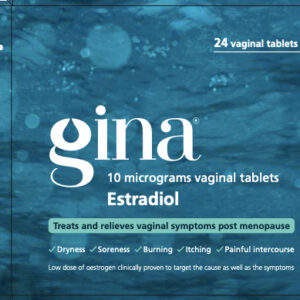HRT
Our selection of hormone replacement therapy medicines offers targeted solutions for those experiencing menopause or hormonal imbalances. These HRT options are vital to ease common menopausal symptoms by replenishing hormones that naturally decline with age. Read More…

-
About Hormone Replacement Therapy
Hormone Replacement Therapy (HRT) is a treatment used to alleviate symptoms associated with menopause and hormonal imbalances. During menopause, the body’s production of hormones such as oestrogen and progesterone declines, leading to various symptoms like hot flashes, night sweats, mood swings, and vaginal dryness. HRT works by supplementing these hormones to restore balance and provide relief. It’s available in different forms, including tablets, patches, gels, and sprays, each tailored to individual needs. However, it’s important to discuss the benefits and risks with a healthcare professional, as HRT may not be suitable for everyone.
-
Symptoms of Menopause
Menopause typically occurs in a woman’s 40s or 50s. The transition can bring a variety of symptoms, which may include:
Changes in Menstrual Cycle: Periods may become longer or shorter, heavier or lighter, and more or less frequent until they eventually stop.
Vasomotor Symptoms: Hot flashes, night sweats, and flushing are common and can last for several years.
Vaginal Symptoms: Dryness, discomfort, and itching in the vaginal area can occur, along with discomfort during sexual intercourse.
Mood Changes: Some women experience mood swings, anxiety, or depression during menopause.
Sleep Problems: Insomnia or disrupted sleep is often reported.
Physical Changes: These may include weight gain, thinning hair, dry skin, and loss of breast fullness.It’s important to note that every woman’s experience with menopause is unique, and symptoms can vary in severity and duration. Hormone replacement therapy (HRT) is often used to alleviate these symptoms by replacing the hormones that are at low levels.
-
Diagnosis
Menopause is typically diagnosed based on a woman’s symptoms and a review of her medical history. In healthy women over 45 years, menopause is clinically diagnosed if they have not had a period for at least 12 months and are not using hormonal contraception, or if they do not have a uterus and have menopausal symptoms.
The diagnosis of menopause typically involves the following medical steps:
Clinical Assessment: Menopause is usually diagnosed based on a woman’s age, symptoms, and menstrual history. If a woman is over 45 years and has not had a period for at least 12 months, menopause is likely. For women under 45, a diagnosis of premature ovarian insufficiency (POI) may be considered if menopausal symptoms are present and periods have stopped.
Blood Tests: Although not always necessary, blood tests measuring levels of follicle-stimulating hormone (FSH) and oestrogen might be used to confirm menopause, especially in women under 45 or those with atypical symptoms. Elevated FSH levels and low oestrogen levels are indicative of menopause.
Symptom Evaluation: Healthcare professionals will assess the severity and impact of menopausal symptoms, such as hot flashes, night sweats, mood changes, and vaginal dryness, on the woman’s quality of life.
Risk Assessment: Before recommending hormone replacement therapy (HRT), doctors will evaluate the potential risks based on the woman’s medical history, including any history of breast cancer, heart disease, stroke, or blood clots.
Personalised Treatment Plan: The choice of HRT (e.g., oestrogen-only, combined oestrogen and progestogen, or other combinations) and its form (e.g., tablets, patches, gels) will depend on the individual’s symptoms, health risks, and preferences.It’s important for women experiencing menopausal symptoms to consult with their healthcare provider for a proper diagnosis and tailored treatment plan.
-
Treatment
Over-the-counter hormone replacement therapy (HRT) medicines can be an effective solution for women experiencing menopausal symptoms. While they don’t replace the full scope of prescription HRT, they offer a convenient option for certain conditions associated with menopause.
One of the available products is Gina 10 microgram vaginal tablets, which contain the active ingredient estradiol. This medication is particularly helpful for treating menopausal vaginal symptoms, such as dryness, soreness, burning, itching, and painful intercourse. It provides a low dose of oestrogen directly to the vaginal tissue, helping to alleviate discomfort and improve vaginal health.
For those struggling to get HRT from their GP or who only experience vaginal symptoms, Gina tablets may be a suitable option. These tablets are advantageous because they don’t require a doctor’s appointment and can be obtained directly from a pharmacy, which often has more flexible hours than GP surgeries. Furthermore, it’s always recommended to inform your doctor if you decide to use Gina, as they should be aware of all treatments you are using.
For women experiencing more generalised menopausal symptoms beyond vaginal dryness, such as sleep issues or hot flushes, a full assessment and a more comprehensive HRT plan may be necessary, which would typically involve a prescription from a healthcare provider.
While over-the-counter options like Gina are an important part of the available treatments for menopause, it’s essential for women to have a conversation with their healthcare provider to understand the benefits and risks and to ensure they receive the most appropriate treatment for their individual symptoms and health profile.
-
Prevention Strategies To Alleviate Symptoms
To potentially alleviate menopause symptoms, adopting a healthy lifestyle and following these methods can be beneficial:
Quit Smoking: Reduces symptom severity.
Adequate Sleep: Improves mood and cognitive function.
Caffeine Reduction: Helps with sleep and bladder control.
Regular Exercise: Assists with mood and physical health.
Stay Hydrated: Eases hot flashes and supports overall health.
Temperature Control: Alleviates discomfort from hot flashes.
Vaginal Lubrication: Addresses dryness and discomfort.
Dietary Adjustments: Reducing spicy/acidic foods can lessen symptoms.
Support Networks: Helps with emotional aspects of menopause.
Phytoestrogens Intake: May balance hormone levels and reduce symptoms.For more detailed guidance, discussing with a healthcare provider is recommended.













